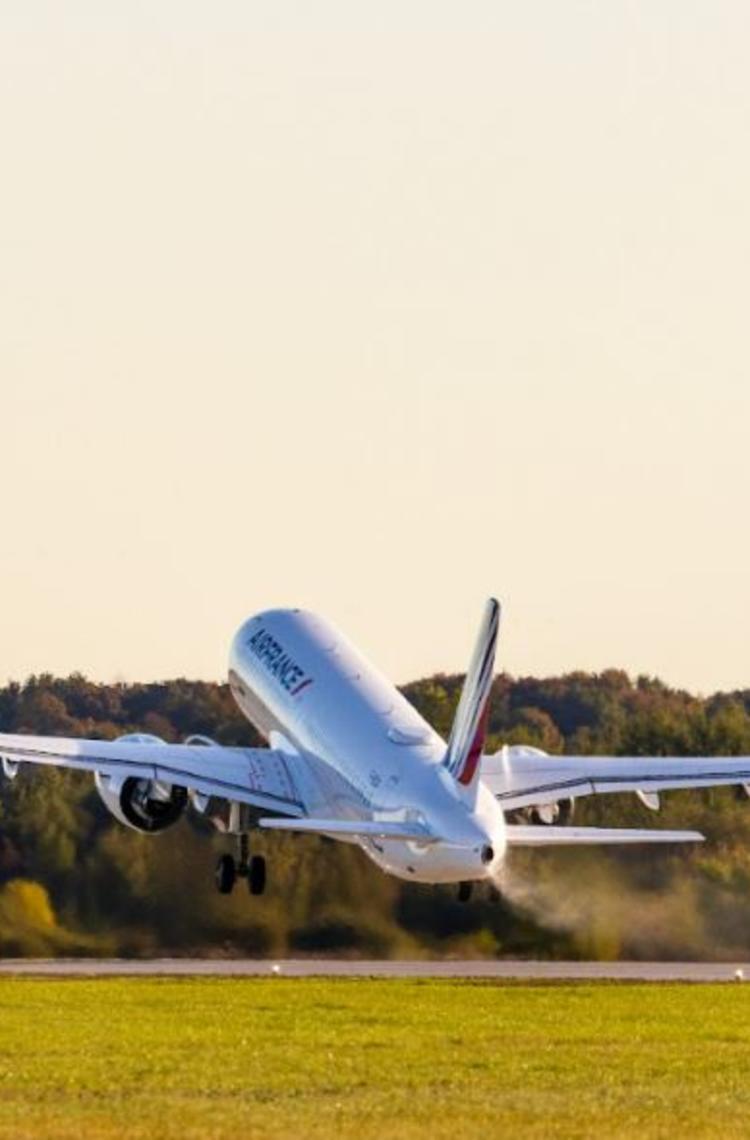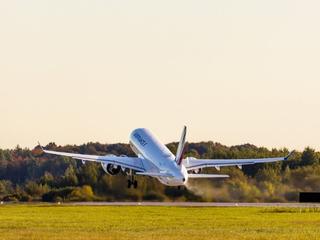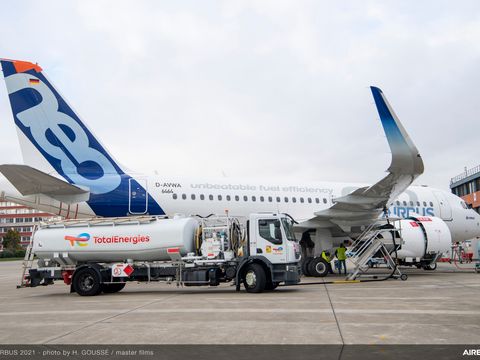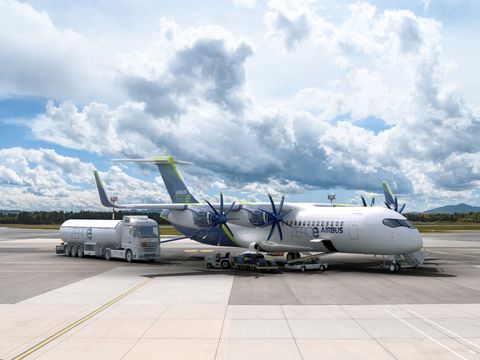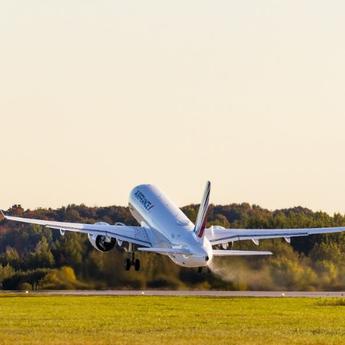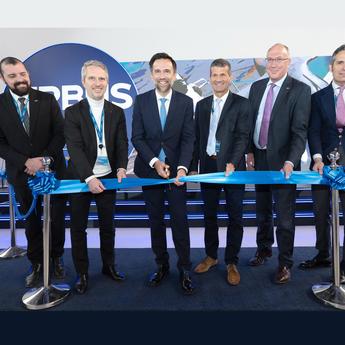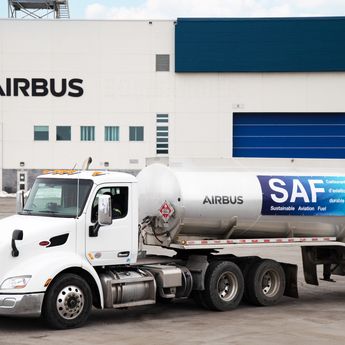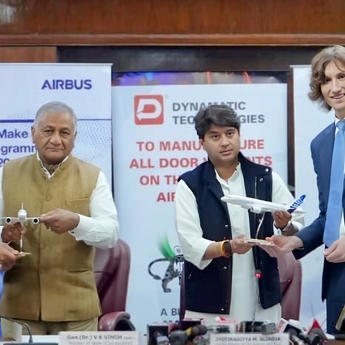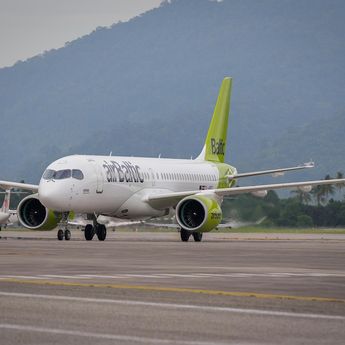Mirabel, Canada, 25 August 2025 – An Air France Airbus A220 today completed its delivery flight from Airbus’ site in Mirabel to Paris powered by sustainable aviation fuel (SAF).
This marked a significant step forward: Airbus in Canada directly issued official sustainability credentials for SAF to a customer for the first time.
This landmark flight not only confirms Airbus' capability to provide Proofs of Sustainability (PoS) directly to customers and operators but also supports the industry's commitment to decarbonisation. With PoS credits for a 50% SAF blend applied through the mass balance process, this ferry flight conducted by Air France's 46th A220-300 named “VAISON-LA-ROMAINE”, represented more than 25 tonnes reduction in lifecycle greenhouse gas (GHG) emissions compared to fossil fuels.
“Fleet renewal and the use of sustainable aviation fuel are the two main levers of the decarbonization of aviation. Combining the two is only logical and Air France-KLM is proud to participate in this Airbus milestone with the delivery flight of one of our A220s. Air France-KLM is among the world’s largest buyers of SAF. Directly receiving SAF at delivery is a game-changer, increasing transparency and driving industry progress,” said Blaise Brigaud, SVP Group Sustainability, Air France-KLM.
Since the announcement of the first sustainable aviation fuel (SAF) delivery at Airbus site in Canada, enabling the Mirabel teams to use SAF for A220 production, customer acceptance, and test flights, this achievement solidifies Airbus' commitment to using SAF for internal operations as well as customer ferry flights across all its commercial aircraft assembly sites and delivery centers worldwide.
"In 2025 alone, we project cutting CO2 emissions by approximately 400 metric tonnes at our Mirabel site thanks to the 170,000 litres of pure SAF we will integrate to our activities," said Benoît Schultz, CEO of Airbus Canada."And we're pushing our ambition further with this ferry flight with PoS credits for 50% SAF – a significant step that comes just ahead of Air France’s 50th A220 delivery later this year. On a global scale, 78% of Airbus aircraft were delivered with SAF blend for the first half of the year, underscoring the importance our customers place on decarbonisation."
As with all Airbus aircraft, the A220 is already capable of operating with up to 50% sustainable aviation fuel (SAF). Airbus aims for all its aircraft to be capable of operating with up to 100% SAF by 2030. According to the PoS under CORSIA Sustainability Certification Scheme approved by ICAO, the SAF received at Airbus in Mirabel is certified for 85% reduction in GHG emissions on its lifecycle compared to fossil fuel. This substantial reduction is crucial to the aerospace industry’s progress towards decarbonization by 2050.
SAF management in Mirabel is done using mass balance, a chain of custody model in which a company accounts for volumes of certified products by looking at the volumes entering the operation and the equivalent volume of products leaving the operations as a measurement, minus any processing losses. As such, the SAF is blended with conventional aviation fuel (Jet A-1) as per established industry standards and auditable bookkeeping.
Air France’s first A220-300s, part of a total firm order of 60 aircraft, have been flying on its medium-haul network since October 2021. The A220 delivers up to 25% lower fuel burn and CO2 emissions per seat compared to previous generation aircraft. For more information on the A220 Programme, visit our A220 dedicated page.
About sustainable aviation fuel (SAF)
SAF is a blended drop in fuel, certified against aviation fuel technical standards. It is a blend of a synthetic component made from renewable feedstocks and conventional fossil fuel. This blend, up to 50%, has the same characteristics as aviation fuels and are certified as such (e.g. Jet A/A1 (ASTM), Number 3 Jet Fuel (China), TS1 (Russia)).
As it is a drop in fuel, it does not require any change to the engines nor to the aircraft and its uptake and combustion has no impact on the safety of operations nor on maintenance tasks.
To be certified as "sustainable", the synthetic blend component must comply with sustainability standards, including minimum Green House Gas (GHG) savings. Hence, the GHG savings on a Life Cycle Assessment basis is only accounted for the synthetic blend component - and not for the conventional fossil fuel. Sustainability criteria is defined by regulations like ICAO CORSIA, EU RED, and UK SAF Mandate. To know more about Airbus’ efforts to support SAF adoption, visit our SAF page.
@Airbus #SAF #SustainableAviationFuel #A220 #AirFrance
Contacts
Annabelle Duchesne
AIRBUS | Canada
Amélie Forcier
AIRBUS | Canada
